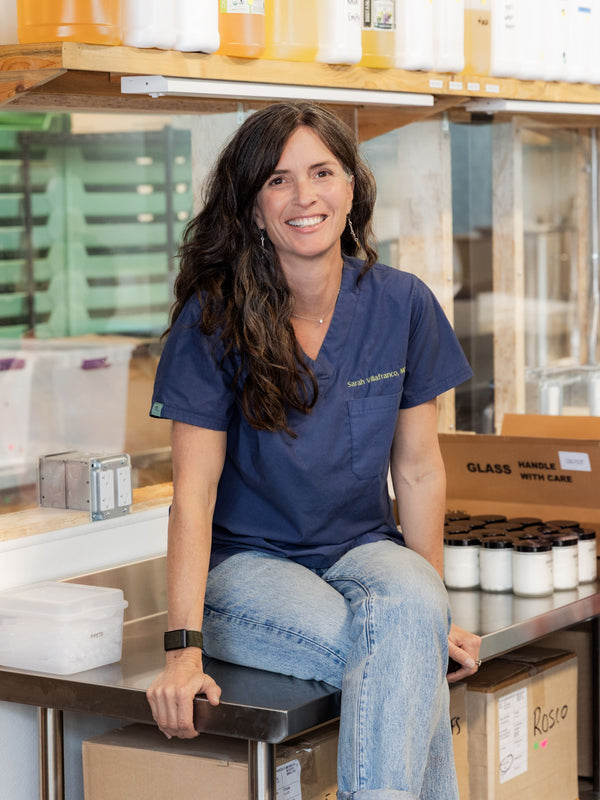The skin below your neck accounts for 91% of your body’s surface area—and it absorbs much of what you put on it. While I could name several facial products I’d love to get off the shelves due to questionable ingredients, switching to clean body care is the smartest first step. It’s simple math: if you want to reduce the number of chemicals you expose yourself and your family to, start with the products you use daily on the greatest surface area of skin.
What’s in a Body Lotion?
Lotions are a mix of oil and water (or a water-like ingredient such as aloe) held together with an emulsifier—something that keeps the blend stable. Think of salad dressing: oil and water separate unless something suspends the mixture.
That emulsifier is usually lab-manufactured. While some newer options are plant-based and biodegradable, others, like the commonly used “emulsifying wax,” are ethoxylated, a process that involves the known carcinogen ethylene oxide and can produce byproducts like 1,4-dioxane, which is considered harmful to human and environmental health.
Most body lotions are roughly 65% water. And because any water-based formula can grow mold and bacteria, lotions must contain preservatives. Natural preservatives are improving, but none are perfect—and some can still cause allergic reactions.
Many lotions also contain “fragrance,” a vague term that can include hundreds of ingredients, some of which may be irritants, allergens, or contain phthalates, used to make scents last longer.
What Makes Body Oil Different?
- No water. Body oils made of oils alone, without the water component.
- No emulsifiers. There’s no need to blend oil and water.
- No preservatives. (Though they should contain antioxidants like vitamin E or rosemary to prevent rancidity and increase shelf life.)
- No synthetic fragrance. Most natural body oils use pure essential oils for scent, though not all so remember to check your labels if you're trying to avoid synthetic fragrance.
Why Should I Switch to Body Oil?
Imagine this: you step out of the shower, towel off completely, then slather on a lotion made mostly of water, preservatives, and synthetic fragrance. Why would you apply mostly water to freshly dried skin and pay for potentially unhealthy ingredients your skin doesn’t need?
With a beautifully-crafted natural body oil, you provide the water—visible on your freshly showered, wet skin—and use your hands to mix the oil and water right there on your body. You become The Emulsifier. And the result? Moisture that lasts hours and velvety-soft skin.
You may need to walk around naked for 3–4 minutes while it soaks in (not a bad thing, really), but once absorbed, you’ll feel soft, not greasy—and you’ll stay that way all day. And if you've tried body oil before and felt like an oil slick afterward, you probably either had the wrong formula (not all body oils are created equal) or applied it when your skin was too dry.
Who Should Try Body Oil?
-
Anyone switching to cleaner skincare
-
Moms reducing ingredient load for themselves and their babies
-
Environmental advocates minimizing their impact
-
People who just love luxurious rituals
Try it for two weeks. You’ll likely never go back.
Can I Make My Own Body Oil?
Absolutely! Here's a simple recipe that absorbs well and leaves your skin feeling amazing when used on wet skin:
DIY Body Oil:
-
4 oz organic sunflower oil
-
2 oz organic jojoba oil
-
1 oz organic sweet almond oil
-
1 tsp natural vitamin E oil
-
Optional: 5–10 drops of organic lavender essential oil
Combine in an 8oz glass bottle, shake gently, apply to wet skin, and enjoy the glow.
Body Oil FAQs
What does body oil do?
It seals in moisture and helps strengthen the skin’s lipid barrier, keeping it soft and resilient.
Is natural body oil good for your skin?
Yes—especially when applied to wet skin. It helps retain hydration and keeps your skin supple.
Body oil vs. lotion: which is better?
Body oil contains fewer ingredients, skips preservatives and emulsifiers, and you're not paying for 65% water. Seems like body oil wins?
What’s the best natural body oil?
Choose an Osmia Body Oil based on the product description and your scent preferences.Night is a best seller, and Naked is not scented if you’re looking for a simpler option.
What is the best body oil for dry skin?
Sunset is especially nourishing to dry skin, but the most important thing is to apply any Osmia Body Oil to sopping wet skin and allow it to air dry for maximum moisture. You can also combine your body oil with a natural body butter for extra nourishment—our body mousse is incredible when combined with a few pumps of body oil!
With love and beautifully soft skin,

The information contained in this post is for educational interest only. This information is not intended to be used for diagnosis or treatment of any physical or mental illness, disease, or skin conditions.























